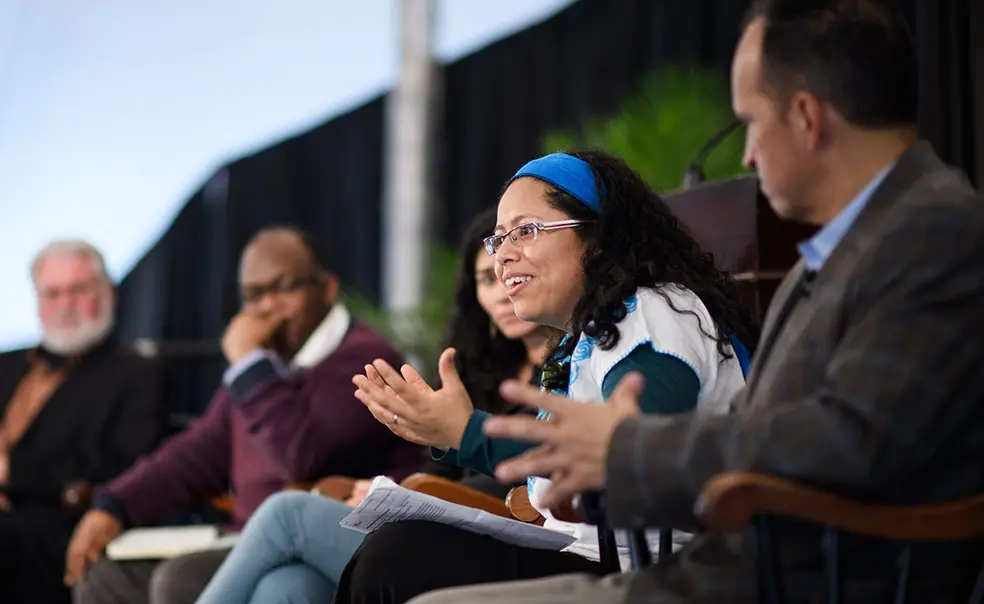¡Adelante Tigres!: Latino Alumni Unite
Conference explores the Latino experience on campus and beyond
On the last weekend in March, 750 alumni and guests returned to Princeton to reflect on the legacy and future of Latino students on campus. The ¡Adelante Tigres! (Forward Tigers!) conference featured alumni speakers from a wide range of professions, as well as faculty lectures and lighthearted programming such as rum tasting and a salsa and bachata dance workshop.
On the opening night, Jose Quiñonez *98, a 2016 MacArthur Foundation “genius grant” recipient, spoke about his work as founder and CEO of the San Francisco-based Mission Asset Fund, which helps minority, immigrant, and low-income people obtain non-predatory loans. The fund’s work, he said, “is about ... respecting people, it’s about meeting people where they are and building on what is good in their lives.”
President Eisgruber ’83 kicked off Friday discussing the University’s efforts to create a more diverse and representative campus. He said that about 18 percent of students admitted to the Class of 2021 are the first in their families to attend college, the highest percentage ever at Princeton. About 21 percent of the admitted students would receive Pell Grants, up from 7.2 percent in 2008. Eisgruber called that increase “the biggest social transformation on this campus since coeducation” and added, “it’s making us a better place.”
Later, during a luncheon speech, Eduardo Bhatia ’86, former president and current minority leader of the Senate in Puerto Rico, decried the recent surge in racism in America. In recalling his parents’ attendance at the March on Washington in 1963, he said, “The idea that we should not be judged by the color of our skin was a powerful message, one that is falling through the cracks in this country today.” He went on to call for more democratic participation, saying that of the 27 million Latinos eligible to vote in the 2016 election, only 13 million went to the polls. “Emerging Latino voices should not be silenced,” he said. “Silence is not an option in America today.”
In a warm and humorous discussion Friday evening, ACLU director Anthony Romero ’87 spoke of the challenges he faced coming to Princeton from a vocational high school in the Bronx. “I came here because affirmative action gave me a shot,” he said. Acknowledging that he often thought of dropping out despite good grades, Romero urged students to face their anxieties head on. “College is about being uncomfortable,” he said. “You should have moments ... where your worldview is challenged. That’s the muscle you build that will allow you to succeed in a very boisterous, messy, and disruptive world.”
Addressing questions, Romero also defended the ACLU’s work. “Our job is to defend the rights of everyone, even the people we don’t like,” he explained. “Sometimes you are defending not very nice people, and that’s where your principles really are tested and matter.”
At the luncheon on Saturday, sociology professor Douglas S. Massey *78 introduced a panel of four alumni who have lived in the United States without documentation. In his introduction, Massey characterized the country’s 11 million undocumented residents as having “no social, economic, or civil rights. They are the most disenfranchised people since slavery.”
One panelist, cardiologist Harold Fernandez ’89, spoke of how he, at 13, embarked with his brother on a perilous journey by sea to escape Pablo Escobar’s drug war in Medellín, Colombia. He spoke of feeling out of place at Princeton, a recurring theme throughout conference panels, and of carrying the additional burden of a secret: “I didn’t have documents and legally didn’t belong here at all.”
When he was summoned to present his documentation to a Princeton dean, he appealed to Professor Arcadio Diaz-Quiñones for guidance. Diaz-Quiñones called then-President William Bowen *58, who met with Fernandez and said he would find a way to keep him on campus.
“The easiest thing to say would have been, ‘You broke the Honor Code; you broke the law; you have to go,’” said Fernandez. “What he did took courage. It took humanity.”












1 Response
Robert Beebe ’74
8 Years AgoProf. Massey, come on,...
Prof. Massey, come on, illegal aliens "are the most disenfranchised people (in America) since slavery"? They chose to come here, breaking our immigration laws, putting themselves in a situation with no legal status. I lived in Russia for 13 years. I could not imagine ever demanding citizenship rights without being in the country legally. Countries have the right, and duty, to enforce their laws.